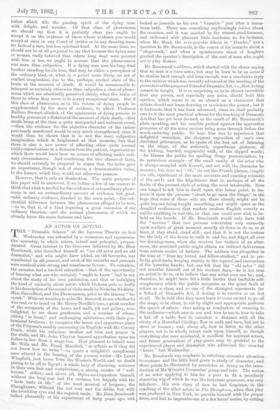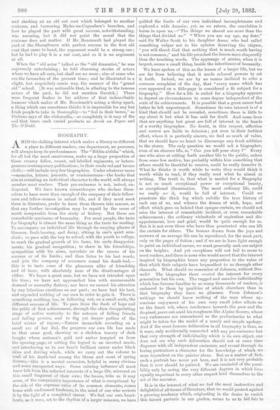AN ACTOR ON ACTING.
THE "Dramatic Seance" at the Lyceum Theatre on last Wednesday was attended by a numerous and representa- tive assembly, in which actors, actual and potential, prepon- derated. Great interest in the discourse delivered by Mr. Dion Boucicault, who described himself as "an old actor and an old dramatist," and who might have added, an old favourite, was manifested by all present, and most of his remarks and precepts were received with strong and unanimous favour. To outsiders, the occasion had a twofold attraction,—that of the opportunity of hearing what one who certainly "ought to know" had to say about the study of his own profession, and that of indulging the kind of curiosity about actors which Dickens puts so drolly in his description of the round of visits made by Nicholas Nickleby, Miss Snevellicci, and the Phenomenon, prior to the famous "be- speak." Without wanting to poke Mr. Bancroft to see whether he was real, or to tread on Mr. Henry Neville's toes, a great number of the occupants of the boxes and stalls, pit and gallery, were delighted to see those gentlemen, and a number of others, sitting "in front," and exchanging salutations with their pro- fessional brethren ; to recognise the heroic and opportune gipsy of the Princess's meekly conversing (in English) with Mr. Corney Grain, while his nefarious brother sat trim and proper in the stalls, and Mr. John Clayton beamed approbation upon his father-in-law from a stage-box. How pleasant to behold were Mr. Wills and Mr. Prank Marshall, "as affable as if they did not know how to write "—to quote a delightful compliment once uttered in the hearing of the present writer—Mr. Lewis Wingfield, just home from the Western World, and no doubt pining to be off to Egypt ; a whole bevy of charming actresses in their own hair and complexions, a strong muster of "well- known" critics; and above all, Myles-na-Coppaleen himself, without the long coat and the caubeen, but happily with the laste taste in life" of the most musical of brogues ; the Shaughraun, without the red coat and the fiddle, but with the twinkling eyes and the roguish smile. Mr. Dion Boucicault talked pleasantly of his experiences of forty years ago, and looked as juvenile as his own " Vampire " just after a moon- beam bath. There was something captivatingly intim about the occasion, and it was marked by the utmost good-humour, and. enlivened with pleasant little incidents, as, for instance, when Mr. Mead, the ever-popular Ghost in "Hamlet," put a question to Mr. Boucicault, in the course of his remarks about a "stage-walk," and when a spontaneous shout of laughter greeted the speaker's description of the sort of man who ought not to play Romeo.
Mr. Bouoicault's address, which started with the clever saying that no man is a born actor, but may be born to be an actor if he studies hard enough and long enough, was a conclusive reply to the opinion which was recently advanced at the meeting of the promoters of the `proposed School of Dramatic Art, i.e., that Acting cannot be taught. It is so surprising as to be almost incredible that any person, and especially any actor, should hold this opinion, which seems to us as absurd as a statement that artists should not learn drawing or musicians the gamut ; but it is fortunate that it has been advanced, since we shall probably owe to it the most practical scheme for the teaching of Dramatic Art that has yet been devised, as the result of Mr. Boncicault's plain speaking, and his sensible protest against the apprentice processes of all the actor novices being gone through before the much-enduring public. To hear him was to experience that delightful sensation, the eloquent exposition of one's own cherished grievances, as he spoke of the lost art of listening on the stage, of the awkward, superfluous gestures, of the kicking, hurried, ungraceful walk, of the clipped words ; —he blames the public for spoiling Stage pronunciation, by its pernicious example—of the small vanity of the actor who is always occupied with himself, and not with the character he assumes, but does not "fill," (is not the French phrase, remplix son role, significant of the more accurate and exacting estimate of the art?) and the fidgettiness that is, perhaps, of all the faults of the present style of acting, the most intolerable. How one longed to ask him to dwell upon this latter point, to im- press it upon the persons "about to go upon the Stage," in the hope that some of those who are there already might not be quite beyond being taught something, and might spare us the dreadful restlessness that renders modern English comedy so unlike anything in real life, or that one could ever wish to be- hold on the boards. If Mr. Boucicault would only have told the " novices " that two persons conversing very earnestly upon matters of great moment usually sit down to do so, or at least, if they stand, stand still ; and that it is not the custom for the lady of the house to walk to and fro, and fidget all over her drawing-room, when she receives her visitors of an after- noon, the wretched public might obtain an indirect deliverance from certain modes of torture. The address was altogether in the tone of "Dear my friend and fellow-student," and in per- fectly good-taste, keeping strictly to the reproof and instruction of the 'prentice hands; but one felt that the "old actor" did not consider himself out of his student days,—he is too true an artist to do so, or to believe that any artist ever can be ; and, therefore, he might have hit a little harder that ineffable self- complacency which the public recognise as the great fault of actors as a class, and as one of the strongest arguments for a School of Dramatic Art, if Acting is to survive as an Art at all. To be told that they must learn to come on and to go off the stage, to be silent, to aid by slight and appropriate gestures the speech of others—thus acting as conductors of meaning to the audience—which arm to use and how to use it, how to take a hat off a table, how to calculate a distance with all the nicety of a Hannibal Chollop ; How to walk and turn, but not to strut or bounce ; and, above all, how to listen to the other players, not to be wholly intent each upon himself, as though everything else were accidental, is excellent for aspirant actors, and future generations of play-goers may be grateful to the experienced player and dramatist who addressed the crowded " house " last Wednesday.
Mr. Boucicault was emphatic in rebuking excessive attention to costume and the little heed given to study of character, and these points he illustrated by anecdotes as funny as the intro- duction of Mr.*yincent Crummles' pump and tubs. The notion of an actor applying to him for a part to fit a peculiarly charming wig of which he was the fortunate possessor, was very felicitous. His own story of how he had forgotten, in the coaching of the other actors in The Shaughran, when that play was produced in New York, to provide himself with the proper dress, and had to improvise one at a few hours' notice, by cutting and slashing at an old red coat which belonged. to another costume, and forrowing Myles-na-Coppaieen's breeches, and. how he played the part with great success, notwithstanding, was amusing, but it did not point the moral that the costume does not matter. If Mr. BoadiceaIt had, played the part of the Shaughraun with perfect success in the first old coat that came to hand, the argument would be a strong one ; but he had to play it in a red coat, and so it is no argument at all.
When the "old actor" talked as the "old dramatist," he was supremely entertaining ; he told charming stories of actors whom we have all seen, but shall see no more ; also of some who are the favourites of the present time; and he illustrated in a slight, but exquisitely comic way, the manner of the "grand old." school. [It was noticeable that, in alluding to the famous actors of the past, he did not mention Garrick.] There were frequent flashes in his address of that indescribable humour which makes of Mr. Boucicault's acting a thing apart, a thing which one sometimes thinks it is impossible for any but Irish people to take in thoroughly—to "feel in their bones," as Dickens says of the violoncello,—so completely is it racy of the soil that bears such varied products as Arrah Iva Pogue and The O'Dodd.



































 Previous page
Previous page